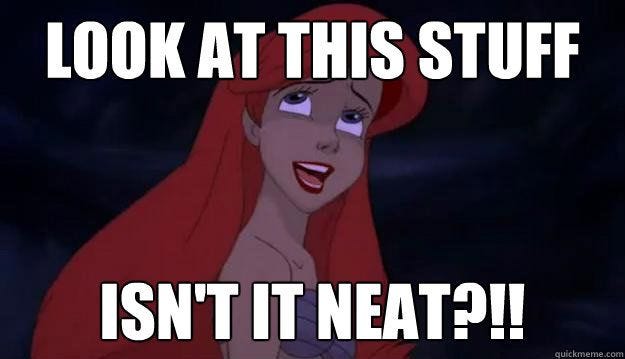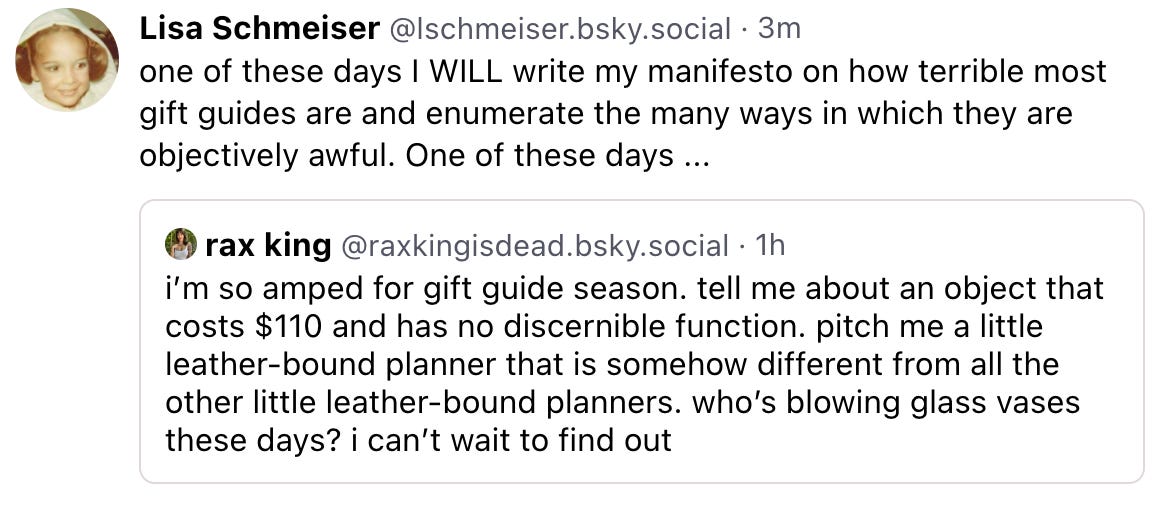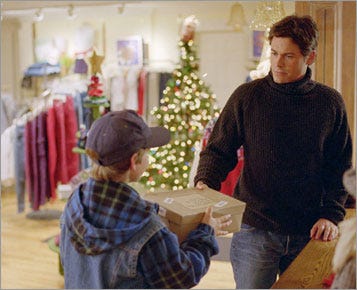Gift Guides Are Terrible And Useless
We just can't have nice things -- even when someone tries to round up nice things
I woke up this morning and chose violence:
So why not write that manifesto now? Here it is: Gift guides are terrible for many, many reasons, including but not limited to:
First: They presume a budget most people do not have
Who is out here buying $88 sugar scrubs for people like paying four Jacksons, a Lincoln and three Washingtons is a good and normal thing to do for a tub of gritty goop that exists to be rinsed down the drain?
According to the National Retail Federation, a trade group that keeps close tabs on holiday spending, the average U.S. shopper plans to spend $875 this year, with $620 spent on gifts and another $255 on decorations, candy and food. Enjoy buying those seven tubs of sugar scrub and calling it a year!
Second: They Round Up Crap None of Us Need
It’s true. You don’t need whiskey stones or tiny cheese knives or a weirdly light plush blanket made of plastic fibers that are gonna kill the fish the first time you throw that thing in the wash.
Third: Editorially Speaking, Nobody Is Doing Them Right
The NRF has handed people everything they need to write the world’s most useful gift guide — take the average budget, then compose the gift guides to show how to get the most bang for your buck.
It is God’s private mystery why some enterprising editor has not said, “Right — we’re doing one $620 gift guide for a couple of DINKs who love spoiling their two nephews and a niece, one $620 gift guide for a single parent with two teen kids and a partner who has no interest in collaborating, one $620 gift guide for the middle-aged parents whose college grad just moved back in, one $620 gift guide for the happily single woman who is still expected to shop for everyone else as if she has nothing else going on, one $620 gift guide for the lawyer who puts his job before his family” and so on.
You don’t even have to do gift guides by family configuration! You could do $620 gift guides that allow people to select specific gifts for specific reasons — “If I buy seven of these sugar scrubs at $88 apiece, do I still have money to buy myself a pop socket?” — and then total everything up to see what it costs. You could offer curated shopping lists where people click a button to order everything and you get the affiliate commission.
The whole point to a gift guide is that it should help the reader answer these questions:
How do I find cool stuff that meets my people’s specific interests? and
How do I bring it in under my budget?
A gift guide should not make people feel like they’re monsters for saying, “… I don’t think I can spend up to $50 per coworker?” It should offer readers multiple ways to feel as if they are capable of giving gifts that delight recipients without going broke — or leaving either giver or recipient feeling as if they’ve cheaped out.
Fourth: Gift Guides Make It Clear Readers Are Not a Priority
A gift guide is basically, “Look at this stuff, isn’t it neat?” It’s meant to solve this reader problem: “I don’t have a lot of time to shop, my brain is already overloaded, and every gift-buying experience requires a lot of emotional and mental labor.”

My ultimate complaint is — the majority of gift guides being offered by the well-funded outfits are rotten solutions. They’re driven by affiliate revenue partners and product placement from Big Whiskey Rock and SEO algorithms — all the depersonalized revenue systems that leave everyday individuals with the distinct impression that none of this content is for them, the audience.
Fifth: Gift Guides Do Not Fix What Is Fundamentally Wrong With Holiday Stress
I had to recently make my holiday wish list for my family, and the first problem I encountered was that nothing I wanted was tangible. I want someone to arrange to deep-clean the house and completely eliminate the wear of eleven years of family life and Eurovision watch parties and pandemic lockdown; I want the mental reserves I had in my twenties where I could work all day and write all night; I want my favorite day spa to be not burned down so I can have a 90-minute massage there. I want time, energy and a sense of agency.
Nothing in any gift guide addresses the ongoing cortisol-pumping stress of daily life in the United States in the 2020s. A sugar scrub in the shower will not offset the low-grade anxiety of sending your kid to school every day and wondering what will happen if someone with an AR-15 gets in. It won’t mitigate the bitter experience of trying to navigate the U.S. health insurance system in the quest to have a little health care, as a treat. Those grains won’t detoxify misinformation as part of our cultural ecosystem, exfoliate institutional self-interest, or — you know where this is going.
The point to the holidays is that it’s supposed to be a time when you’re feeling peace on earth, etc., etc. — it’s the time for taking a pause in the quiet of winter, for us to live Susan Cooper’s poem, “The Shortest Day:”
This Shortest Day,
As promise wakens in the sleeping land:
They carol, feast, give thanks,
And dearly love their friends,
And hope for peace.
And now so do we, here, now,
This year and every year.
It is hard out there this year. People are feeling the bite of inflation and that makes navigating a land of relentless holiday messaging stressful. I am mad because gift guides could be such a gift unto themselves, a way for media outlets to say, we see how it is and we’re here to put our information-gathering and assessment skills to work for you.
I know it’s possible to combine festive expectations with real-world constraints — Aaron Hutcherson did a really interesting feature over at Washington Post where he developed a six-dish Thanksgiving feast with just 20 ingredients, then walked people through how to shop for and stretch each one of them.
I know it’s possible to address gift-giving with specificity — the Strategist Gift Scout lets you type in a description of your recipient and select among their suggestions, and when I queried, “elegant, erudite empty-nester” for one recipient on my list, I didn’t hate the results.
Why can we not get any level of intentionality toward readers in gift guides?
*
The TL;DR — gift guides are representative of larger institutional failures and they ultimately do not solve the problems they claim to. I said what I said.
That said — I’m open to being wrong about this. I am sure a thousand thoughtful Substack-y gift guides exist. I’d love to see them done right! Thank you for your time, and please do not hesitate to share your gift guide complaints and/or recommendations with me.






My inbox right now is:
“gift guide!”
“gift guide!”
“gift guide 1 of 10!”
“gift guide!”
Lisa
“gift guide!”
Yours is the only one I’ve opened, and the others are now at severe risk of deletion
I love gift suggestion catalogs. Hee. One year I cut out pics and glues to cards, saying if we were baziionaires, this us what they'd get.